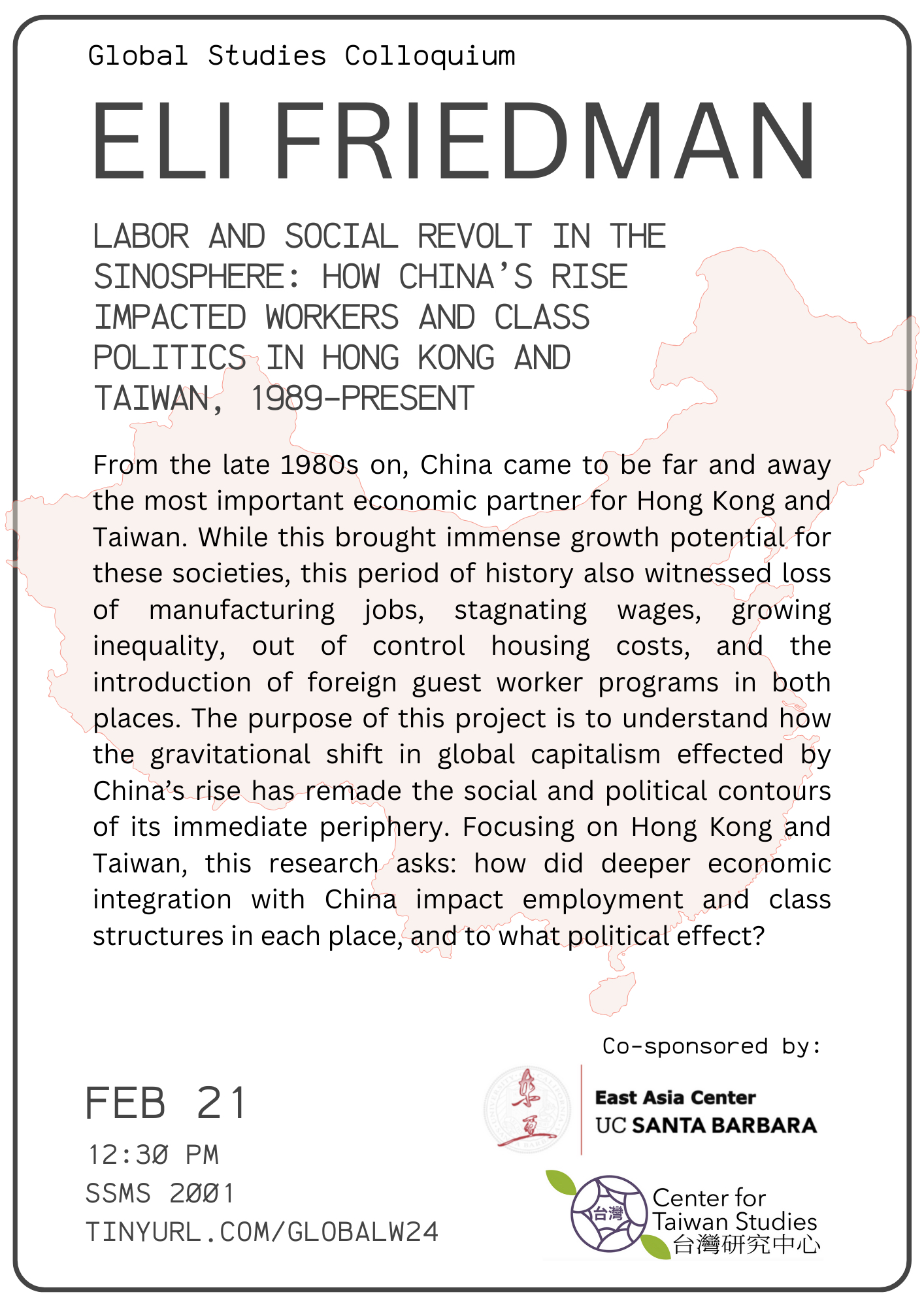
- This event has passed.
Labor and Social Revolt in the Sinosphere: How China’s Rise Impacted Workers and Class Politics in Hong Kong and Taiwan, 1989-present
February 21, 2024 @ 12:30 pm - 2:00 pm

Labor and Social Revolt in the Sinosphere: How China’s Rise Impacted Workers and Class Politics in Hong Kong and Taiwan, 1989-present
Eli Friedman
Co-sponsored by the East Asia Center and the Center for Taiwan Studies
Wednesday February 21
12:30-2 pm PST
In-Person: SSMS 2001
Zoom: tinyurl.com/Globalw24
From the late 1980s on, China came to be far and away the most important economic partner for Hong Kong and Taiwan. While this brought immense growth potential for these societies, this period of history also witnessed loss of manufacturing jobs, stagnating wages, growing inequality, out of control housing costs, and the introduction of foreign guest worker programs in both places. The purpose of this project is to understand how the gravitational shift in global capitalism effected by China’s rise has remade the social and political contours of its immediate periphery. Focusing on Hong Kong and Taiwan, my research asks: how did deeper economic integration with China impact employment and class structures in each place, and to what political effect? I employ a transnational and comparative perspective to understand how capital, workers, unions, social movements, and political parties in Hong Kong and Taiwan responded to economic changes in the wake of China’s rise, and how they articulated a political response. By delineating three distinct historical phases in the relationship with Mainland China, I show how market integration ushered in a brief blossoming of PRC-centric hegemony across Sinophone Asia in the 2000s, only to be undermined by the social revolt of downwardly mobile youth in the mid-2010s. While most analyses of China’s increasingly coercive approach to Hong Kong and Taiwan focus on the proclivities of Xi Jinping or geopolitical tensions with the West, I point to how market-based integration undermined the social basis of hegemonic rule. Thus, I contend that we need to understand how China’s economic rise impacted workers in Taiwan and Hong Kong to explain how Beijing’s efforts to peacefully integrate the imperial periphery went from boom to bust in less than a generation.
Eli Friedman is an Associate Professor of Global Labor and Work at Cornell University’s ILR School. He is the co-author of China in Global Capitalism: Building International Solidarity Against Imperial Rivalry (Haymarket, forthcoming), and the author of The Urbanization of People: Development, Labor Markets, and Schooling in the Chinese City (Columbia, 2022), and Insurgency Trap: Labor Politics in Postsocialist China (Cornell, 2014).
UCSB Global Studies Colloquium Winter 2024
- 1/10 Stuart Schrader / Imperial Entanglements: New Approaches to the Critique of Police Power
- 1/17 Hannah Appel / Pan African Capital? Banks, Currencies, & Imperial Power
- 1/24 Juan De Lara / Guns and Goods: Military Bases, Capitalist Crisis, and Modern Supply Chains
- 1/31 Lisa Bhungalia / Elastic Empire: Refashioning War through Aid in Palestine
- 2/7 Jayson Porter / This Chapter May Contain: Fats, Oils, and Other Interchangeable Elements of Power
- 2/14 Colleen Lye / A Value Theory of the Cultural Turn
- 2/21 Eli Friedman / Labor and Social Revolt in the Sinosphere
- 2/28 Michael Watts / Another Form of Hydrocarbon Capitalism: Commodity Theft, Pipeline Politics and Frontier Spaces
- 3/6 Jaime Alves / They All Wear Boots: Empire, Mercenaries and Antiblack Terror Surplus
- 3/13 Sunila Kale / The global context of artisanal labor in urban India